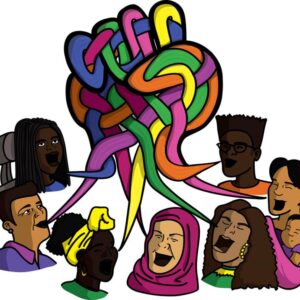This coming week, the CFF team is headed to Cape Town, South Africa for the largest global conference dedicated to the topic of sexual violence, the Sexual Violence Research Initiative (SVRI) Forum. We’re excited to participate alongside a number of our collaborative donor partners and grantee partners, and especially to be bringing a delegation of CFF staff and all five members of our newly formed Advisory Council.

One reason we’ve chosen to attend this global conference is that we’ve been focusing more attention on deepening our networks of solidarity — across borders, across strategies, across sectors. At its most basic, this is about being in community with fellow feminist intermediaries, activists, advocates, and donors to broaden our perspectives and to strengthen our collective impact.
The urgency of the global context in this moment also demands building networks of solidarity. If we’ve learned anything from the COVID pandemic, the expanding “anti-gender” and anti-rights movements, and the climate crisis, it’s that threats to our shared safety and democracy cannot be confined by borders. These multiple crises have intensified and brought new visibility to structural injustices along lines of gender, race, class, dis/ability, and nationality.
While the majority of our grantee partners are US-based, we know that the local is global and the global is local. The women of color and gender-expansive people of color survivors who lead the movement organizations that we support have transnational political identities, kinship, histories, experiences, and movement-building strategies.
One clear example is the #metoo movement, which has presented an opportunity for feminist movements around the world to engage in global learning and dialogue around what sexual and gender-based violence mean for them. It moved the conversation about sexual violence from the individual perspective to the collective, cultural, and structural context, and moved us from silence to solidarity. As Tarana Burke, Founder and Chief Vision Officer of metoo. International, has reflected: “It sparked a global reckoning and became a connective framework for movements across the globe.”
The power of feminist movements lies in our ability to work at the intersections and to be effective in doing so. As we continue to learn and develop our transnational approach as an intermediary feminist fund, we will share with you how it will continue to evolve in our work